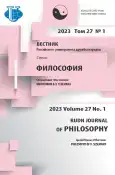National Self-determination: Features of the Evolution and Functioning of the Phenomenon
- 作者: Sanakoev I.B.1, Kulumbegova L.T.1, Ivleva M.L.2
-
隶属关系:
- A.A. Tibilov South Ossetian State University
- Рeoples’ Friendship University of Russia (RUDN University)
- 期: 卷 27, 编号 1 (2023): PHILOSOPHY OF V. SESEMANN
- 页面: 153-162
- 栏目: SCIENCE, PHILOSOPHY, RELIGION
- URL: https://journal-vniispk.ru/2313-2302/article/view/325286
- DOI: https://doi.org/10.22363/2313-2302-2023-27-1-153-162
- EDN: https://elibrary.ru/QVENEK
- ID: 325286
如何引用文章
全文:
详细
The article analyzes the phenomenon of national self-determination in terms of evolution and functioning. The authors aim to determine the general characteristics and evolution of this phenomenon in both conceptual and applied versions. In the evolution’s context of national self-determination as a theoretical concept and a political and legal principle, several stages were identified and considered. According to the authors, each stage of the phenomenon’s evolution was inevitably accompanied by its qualitative transformations, both in political and legal terms. The first stage (from the end of the XVIII c. till the First World War), according to the authors, is characterized by the emergence of the idea and the formation of the socio-political concept of national self-determination, and the applied aspect of the phenomenon of national self-determination is filled with concrete content based on the ever-expanding political practice of its application. The second stage (from the First World War and the post-war reconstruction) is characterized by the transformation of self-determination from a concept into a political principle. The authors associate the third stage of the evolution of the phenomenon of national self-determination (the period after the Second World War) with the development of international relations and the formation of a global bipolar system. National self-determination turned into a principle of positive international law and laid the foundations for the future political instability of the newly independent states. Finally, the last period (the early 90s to this day) is characterized by the search and crystallization of new approaches to the principle of national self-determination and the emergence of new theories, the authors of which are trying from a political and legal point of view to substantiate the legitimacy of an expansive interpretation of this principle. The analysis allowed us to conclude that the qualitative transformations of the principle of national self-determination presented in the article did not lead to the formation of the phenomenon of national self-determination as an integral, complete, and universally recognized international political and legal norm.
作者简介
Inal Sanakoev
A.A. Tibilov South Ossetian State University
编辑信件的主要联系方式.
Email: inal59@mail.ru
ORCID iD: 0000-0003-4390-1012
Candidate of Political Sciences, Professor, Head of the Department of Political Science and Sociology
8, V.V. Putin str., Tskhinval, 500200, Republic of South OssetiaLena Kulumbegova
A.A. Tibilov South Ossetian State University
Email: linakulumbegova@mail.ru
ORCID iD: 0000-0001-8096-654X
Senior Lecturer of the Department of Political Science and Sociology
8, V.V. Putin str., Tskhinval, 500200, Republic of South OssetiaMarina Ivleva
Рeoples’ Friendship University of Russia (RUDN University)
Email: ivleva_ml@pfur.ru
ORCID iD: 0000-0003-2901-7503
DSc in Philosophy, Professor, Head of the Department of Social Philosophy
6, Miklukho-Maklaya St, Moscow, 117198, Russian Federation参考
- Tsutsiev AA. Territories of problematic sovereignty. Scientific notebooks of the Institute of Eastern Europe. 2006;(1):28-52. Available from: http://www.academia.edu/24013827/28-52 (accessed: 12.02.2018). (In Russian).
- Tashiyan AA. Ethnocratic aspects of the realization of the right of nations to self-determination in modern Russia. [dissertation]. Rostov-on-Don; 2004. Available from: http://www.dissercat.com/content/etnokraticheskie-aspekty-realizatsii-prava-natsii-na-samoopredelenie-v-sovremennoi-rossii (accessed: 06.11.2017). (In Russian).
- Smolovaya ES. The right of peoples to self-determination. Young scientist. 2015;(7):598-605. Available from: https://moluch.ru/archive/87/16796/ (accessed: 07.11.2017). (In Russian).
- Mutagirov JZ. Lenin’s concept of the right of peoples to self-determination and world development in the twentieth century. Proceedings of the Vtoraja ezhegodnaja Mezhdunarodnaja nauchno-prakticheskaja konferencija “Lenin VI. v sovremennom mire”; 2008 apr 22; Razliv. Available from: http://leninism.su/lenin-now/4185-lenin-v-sovremennom-mire-2008.html?showall=&start=12 (accessed: 07.11.2017). (In Russian).
- Aleksanyan SR. The principle of equality and self-determination of peoples in modern international law. [dissertation]. Moscow; 2017. Available from: https://mgimo.ru/upload/diss/2017/Aleksanyan_diss.pdf (accessed: 18.12.2017). (In Russian).
- Merezhko AA. Who has the right to self-determination in Crimea? Available from: http://www.forumdaily.com/kto-imeet-pravo-na-samoopredelenie-v-krymu/ (accessed: 07.11.2017). (In Russian).
- Zohrabyan RP. The principle of equality and self-determination of peoples: the evolution of the content in the system of principles of international law. Vestnik Moskovskogo universiteta. Serija 11: Pravo. 2009;(2):61-73. (In Russian).
- Timoshev RM. The right of nations to self-determination and modern interethnic conflicts. Available from: https://cyberleninka.ru/article/n/pravo-natsiy-na-samoopredelenie-i-sovremennye-mezhnatsionalnye-konflikty (accessed: 24.08.2017). (In Russian).
- Cheshko SV. The crisis of the doctrine of self-determination. Available from: http://histrf.ru/biblioteka/book/krizis-doktriny-samoopriedielieniia (accessed: 07.11.2017). (In Russian).
补充文件









